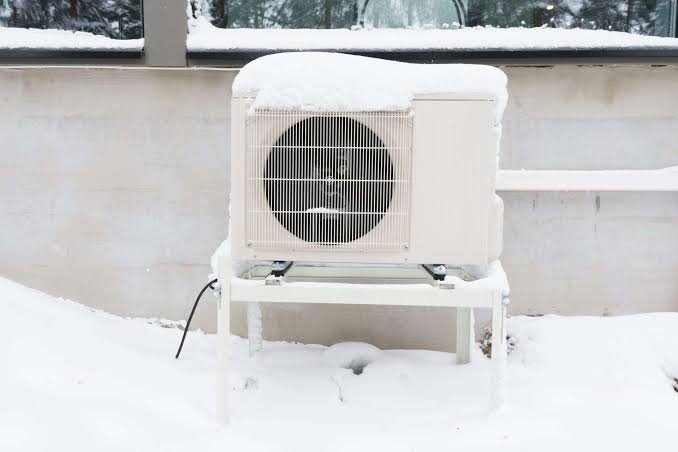Air Source Heat Pumps: Keeping You Cosy Even When It’s Freezing!

Imagine this: it’s the dead of winter, snow is piled high outside, and you’re toasty warm inside your house. Sounds nice, right? Keeping your home warm in cold weather can be expensive, especially if you rely on electricity or gas. That’s where air source heat pumps come in!
Air source heat pumps are amongst the most efficient ways to heat your home. Admittedly, though, it comes at a hefty initial price. The idea was appealing up until the price tags came in. Only if you could get a free air source heat pump. This actually is the case in the UK. The government offers heat pumps, amongst other heating systems, under the ECO4 scheme.
These clever machines can pull heat from the outside air, even when it’s cold, and use it to warm up your house. It’s like magic, but with science! But how well do they work in super cold places? Let’s dive in and see!
How Do Heat Pumps Work?
Think of a heat pump like a refrigerator in reverse. A fridge takes heat out of the food inside and releases it as warm air into your kitchen. A heat pump takes heat from the outside air and brings it inside your house to keep you warm. Pretty cool, huh?
Here’s a quick breakdown of the magic:
- Heat Pump Guts: Inside the heat pump, there’s a special liquid called refrigerant. This liquid can easily absorb and release heat.
- Catching the Cold: Outside, a fan sucks in cool air. The refrigerant, which is already cold, absorbs heat from this cool air, making the refrigerant even colder.
- Getting Hot: The refrigerant then travels inside the heat pump where a compressor gives it a boost, making it really hot.
- Warm Breeze: Inside your house, another fan blows air over the hot refrigerant, warming up the air. This warm air is then distributed throughout your house to keep you comfy.
The neat thing is, the heat pump can also work in the summer like a regular AC unit. It just flips the process around, taking heat from inside your house and releasing it outside.
Cold Weather Challenges
While heat pumps are awesome, they do face some challenges in really cold climates. Here’s why:
- Cold Air, Less Heat: Just like it’s harder to make ice cream on a cool day, it’s harder for a heat pump to extract heat from very cold air. This means the heat pump has to work extra hard, which can make it less efficient.
- The Magic Stuff Gets Thicker: The refrigerant in a heat pump needs to be able to flow easily to work properly. In very cold weather, the refrigerant can get thicker and harder to move around, making the heat pump work less effectively.
Modern Marvels: Heat Pumps for Cold Climates
Don’t worry, though! Technology is always improving, and there are now heat pumps specifically designed for cold climates. These special heat pumps have:
- Smarter Refrigerant: They use a different type of refrigerant that stays flowy even in cold temperatures.
- Cold Weather Toughness: They have special components that can handle the extra strain of working in cold weather.
- Backup Boost: Some models have built-in electric heating elements that can kick in when it gets extremely cold to help keep your house warm.
So, Will a Heat Pump Work in My Cold Climate?
Heat pumps are becoming a great option for even very cold places. Here are some things to consider:
- How Cold Does It Get? If you live in a place with occasional cold snaps, a regular cold-climate heat pump might be enough. But for areas with extremely cold winters, you might need a model with a built-in backup heater.
- Ask the Experts: Talk to a qualified HVAC (heating, ventilation, and air conditioning) technician. They can assess your home and climate and recommend the best heat pump option for you.
Benefits of Heat Pumps in Cold Climates
Even with some challenges, heat pumps offer several advantages in cold climates:
- Energy Savings: Heat pumps are generally more efficient than electric resistance heating, which means they can save you money on your energy bills.
- Double Duty: They can heat your home in the winter and cool it in the summer, making them a versatile choice.
- Environmentally Friendly: Heat pumps use electricity, which can be produced from renewable sources like solar or wind power. This can help reduce your carbon footprint.
Keeping Your Heat Pump Happy
Here are some tips to keep your heat pump running smoothly in cold weather:
- Clear the Way: Make sure there’s at least two feet of clearance around the outdoor unit so air can flow freely.
- Regular Checkups: Schedule regular maintenance with an HVAC technician to ensure your heat pump is working efficiently.
- Seal the Leaks: Draughty windows and doors can make your heat pump work harder. Seal up any leaks to keep the warm air inside.
By following these tips, you can help your heat pump keep your home comfortable and save you money all year round, even in the coldest. With the right size, good insulation, and a little maintenance, they can keep your home cosy even on the coldest days. Just remember, when it comes to staying warm in the cold, air source heat pumps have got your back!



